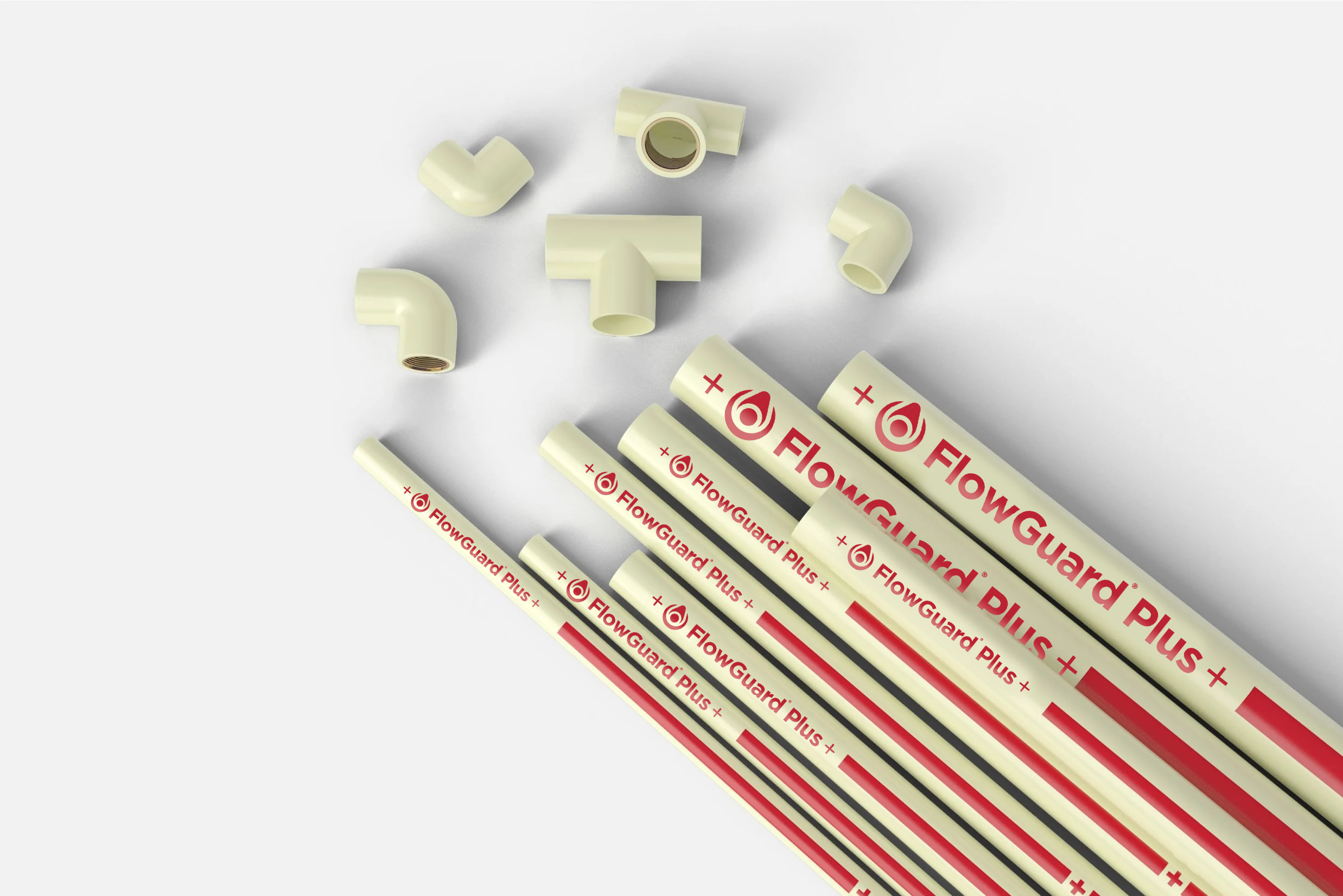
8 Things You Must Know Prior To Investing in CPVC Pipes
Earlier, homeowners did not make an effort to choose their home’s pipes and fittings personally. They often relied on their contractors to get the plumbing work done. However, homeowners today have become more aware of these little yet essential details of their homes. They handpick the best-in-class pipes and fittings to escape the nightmare of unwelcome leakage and seepage. In this blog, we will learn everything you must know about CPVC pipes and fittings, and the best material for pipes used in residential, commercial, and industrial plumbing systems. We will also learn about the factors you must consider before investing in a CPVC plumbing system. Let us start by getting the basics cleared:
What are CPVC Pipes and Fittings?
CPVC, also known as Chlorinated Polyvinyl Chloride, is a type of thermoplastic plumbing material renowned for its durability, chemical resistance, and temperature tolerance. It is popularly used in the manufacturing of pipes and fittings for a plumbing system. To improve their properties, CPVC pipes have been chlorinated, which makes them suitable for both hot and cold water distribution systems. Their main advantages include outstanding resistance to corrosion, high heat resistance (suitable for hot water applications), and ease of installation using solvent welding. CPVC pipes and fittings are widely used in residential, commercial, and industrial applications, particularly for indoor plumbing, potable water supply, and the making of fire sprinkler systems.
Factors You Must Consider Before Investing in CPVC Plumbing Pipes
Now that you know why CPVC fittings and pipes are a good choice for you, let us discuss the factors you must consider before investing in them.
- Material: Although CPVC pipes are a perfect pick for plumbing systems as they are strong, highly durable, and heat- and chemical-resistant, keeping an eye on the uniform quality of products that are provided by the manufacturer is always a good option.
- Certifications: You must check if the manufacturer of CPVC pipes has an ISO certificate. The Bureau of Indian Standards (BIS) is the primary organisation in charge of developing standards and certifying various products, including CPVC pipes. BIS certification ensures that products meet quality, safety, and performance requirements. NSF certification ensures that the product meets strict standards for public health protection. The relevant standard for CPVC pipes in India is IS15778:2007, which indicates the requirements for CPVC pipes for cold and hot water supplies.
- Sizes and Dimensions: There are numerous CPVC pipe sizes and dimensions available in the market. You must check the CPVC pipe length, diameter, and wall thickness to ensure they meet your requirements. Dimensional accuracy is critical for proper fitting and efficient fluid flow.
- Installation Process: Understand the CPVC pipe installation procedure. Pipes such as GI pipes often demand multiple labourers and specialised equipment for installation. However, it is quite easy and time-efficient to install CPVC pipes as they are lightweight and require a minimum number of tools for installation. Solvent cement is typically used to join these pipes, resulting in a strong bond between the pipe and fittings. Understanding the cutting, fitting, and other CPVC-related methods will help ensure a leak-proof system.
- Temperature and Pressure Ratings: Check the manufacturer's specifications for these ratings to make sure that the pipes can withstand the maximum temperature and pressure levels that your plumbing system can withstand.
- Manufacturing Company Details: Look for information like how old the company is, if they have ISO certification, the quality of the raw materials that they use, the credibility of the brand, etc. This will help you make a sound choice when picking from a variety of CPVC pipes and fittings.
- Usage and Application: Determine the CPVC pipe usage. Understand whether it will be used for potable (drinking) water, industrial applications, or something else. Each application has its own set of specifications and requirements, such as thickness, temperature resistance, pressure capacity, and so on.
Why Choose FlowGuard Plus?
FlowGuard Plus CPVC Pipes are made by Lubrizol, the Global Pioneers of CPVC Technology in India. It is known for offering only the best-quality CPVC products, ensuring leak-proof plumbing systems. Compounds and technical services are regularly upgraded for valued customers.
The brand ensures that the licensee manufacturer must adhere to Lubrizol's quality assurance program. It is also the first CPVC plumbing technology in India to provide both hot and cold potable water. What more reasons would you need to choose FlowGuard Plus CPVC pipes?
Frequently Asked Questions on Investing in CPVC Pipes
- How do you test the quality of CPVC pipes?
To test the quality of CPVC pipes, you must first check if the pipes are thicker. Thick CPVC pipes are often stronger and more durable. Check the markings on the pipe as well. They indicate the class and type of the pipe, in addition to whether it is appropriate for your intended use. Furthermore, the flexibility of PVC pipe can be used to determine its quality, as high-quality pipes should be able to bend without cracking or breaking. - Is it easy to install CPVC pipes?
Yes. It is easier to install CPVC pipes in comparison to other piping systems such as metal pipes. This is because the installation of metal pipes demands a greater number of labourers as well as specialised equipment. This is not the case with CPVC pipes as they are comparatively lightweight, require a lesser number of labourers, and are easy to install using solvent cement. - Are CPVC pipes suitable for both residential and commercial projects?
Yes. CPVC pipes are suitable for plumbing systems in both residential and commercial projects.

Prasenjit Misra
Prasenjit Misra, an accomplished professional, having extensive exposure in plumbing field, currently holds the position of Lead Demand Creation & Business Development of TempRite South Asia division at Lubrizol India.
